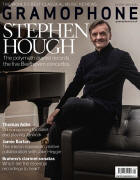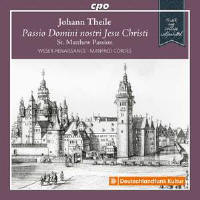Texte paru dans: / Appeared in: |
|
|
Outil de traduction (Très approximatif) |
|
|
Reviewer:
Peter
Quantrill The Passion settings of Schütz, from around 1666, still follow the example of Victoria and the polyphonists in setting the text unadorned and a cappella. Yet in 1673 we find his pupil Johann Theile (16461724), Kapellmeister at the Lower Saxony court of Wolfenbüttel, following the example of the Resurrection History of 1622 by interpolating arias and scoring the whole as an archaic oratorio for consorts of voices and strings, continuo and organ. The four solo ‘arias’ are mostly simple treatments of hymn verses, the highlight among them being a reflection on Peter’s denial, and Theile’s Passion concludes with a four-part harmonisation of another hymn. The difference between Theile’s St Matthew Passion and Bach’s setting of half a century later is one of degree rather than form: all the main features – chorus, recitative, aria and chorale – are common to both. In fact there was something of a hiatus between Theile’s work and Bach’s composition of the St John Passion in 1723 – less than a handful of German composers followed Theile’s lead – making this St Matthew setting something of an undervalued (certainly under-recorded) missing link between Bach and his most distinguished predecessors in the genre. It is supposed though not substantiated that Theile by turn influenced and possibly even taught Buxtehude, Bach’s model, as well as attracting the much-valued praise of the theorist Mattheson for his mastery of counterpoint. CPO has a track record of reviving Theile, with several attractive sacred and secular albums in its catalogue, and this is the second of them to feature the reliably excellent Weser-Renaissance ensemble of Bremen. I prize their account of Schütz’s Cantiones sacrae, now 20 years old, above the competition, for its sensuous delight in word-painting and chromatic harmony, consummate control and softly haloed acoustic. The ensemble’s individual voices have changed over the years without spoiling those virtues, and though Theile rivalled his teacher more in industry than innovation – you will listen in vain for any examples of his vaunted contrapuntal skills – the hour and the story pass rapidly thanks to Manfred Cordes’s masterful handling of vocal and instrumental textures and the assured, understated delivery of the Evangelist’s part by Hans Jörg Mammel. Strongly recommended to Passion completists.
|
|




